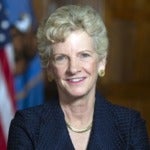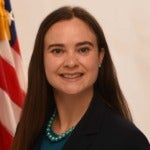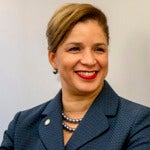Boosting a Household’s Ability to Weather Financial Storms: Federal and State Leadership to Modernize Public Benefits
Policymakers at the highest levels of federal and state governments are fundamentally reshaping how benefits are delivered to people in the U.S. to build financial resilience. In this discussion, co-sponsored by the Aspen Institute Financial Security Program and the United States Office of Management and Budget, federal and state leaders will share their plans to modernize public benefits delivery, highlight new opportunities for partnership between federal and state governments to improve financial resilience, and set forth a vision for how public benefits are delivered in the coming years.
Agenda
9:30 a.m. | Welcome
- Ida Rademacher, Vice President, Aspen Institute and Co-Executive Director, Financial Security Program
- Neera Tanden, Senior Advisor and Staff Secretary to President Biden
- Robin Carnahan, Administrator, General Services Administration
10:00 a.m. | Federal Agency Action on Financial Resilience
This panel will highlight the findings from the cross-agency Life Experience Project on “Facing a Financial Shock,” as part of the President’s Executive Order on Transforming Customer Experience, and include opportunities for states and other collaborators to give input on the work. Additionally, following the White House Conference on Hunger, Nutrition, and Health, senior federal officials will outline the key goals for priority initiatives and how they aim to affect the lives of people in the U.S.
- Andrea Palm, Deputy Secretary, U.S. Department of Health and Human Services
- Chike Aguh, Chief Innovation Officer, U.S. Department of Labor
- Simchah Suveyke-Bogin, Chief Customer Experience Officer, U.S. Department of Agriculture
- Tim Shaw, Policy Director, Aspen Institute Financial Security Program (moderator)
11:00 a.m. | Modernization of Public Benefits at the State Level
While federal policy sets the rules for public benefits, states and localities implement them. The success or failure of reaching households through these programs depends on the effective administration of those benefits by state and local leaders. This panel will feature key leaders in states and their supporting partners working towards modernizing public benefits delivery. Panelists will highlight critical new benefits programs, provide lessons learned to other leaders considering similar initiatives, and discuss what support will be needed from federal partners moving forward.
- Justin Brown, Secretary, Oklahoma Department of Human Services
- Jilma Meneses, Secretary, Washington State Department of Social and Health Services
- Terri Ricks, Secretary, Louisiana Department of Children and Family Services
- Sarah Esty, Senior Advisor, Administration for Children and Families, U.S. Department of Health and Human Services (co-moderator)
- Alicia Rouault, Facing Financial Shocks Lead, U.S. Digital Service, Executive Office of the President (co-moderator)
12:00 p.m. | Closing Remarks
- Ida Rademacher, Vice President, Aspen Institute and Co-Executive Director, Financial Security Program
- Jason Miller, Deputy Director for Management, U.S. Office of Management and Budget
Speakers

Chike Aguh, Chief Innovation Officer, U.S. Department of Labor
On January 20, 2021, Chike Aguh (Chee-kay Ah-Goo) was sworn in as Chief Innovation Officer (CInO) at the US Department of Labor, appointed by President Biden. Reporting to the Deputy Secretary and also serving as the inaugural Senior Advisor for Delivery, he leads efforts to use data, emerging technologies, and innovative practice to advance and protect American workers.
Previously, Chike launched the Community College Growth Engine Fund, a national multimillion dollar effort helping community colleges train thousands for careers in high growth fields. He has been a Technology and Human Rights Fellow at the Harvard Carr Center focused on the future of work and racial equity, Venture Partner at Maryland-based New Markets Venture Partners focused on workforce technologies, Council on Foreign Relations’ Future of Work Taskforce member, Lecturer at Columbia University and guest speaker at the University of Maryland School of Public Policy.
Additionally, Chike has worked as an education policy official and teacher in America’s largest school system; Fulbright Scholar in Asia; director of corporate strategy and performance technologies at Education Advisory Board (EAB); CEO of a national social enterprise which helped connect 500,000 Americans in 48 states to affordable internet and digital skills; and Senior Principal and Future of Work Lead at the McChrystal Group, a business advisory firm founded by Gen. (ret.) Stanley McChrystal. He has written for, spoken at, or been featured in Forbes, Fast Company, Wired Magazine, FORTUNE, Harvard, Wharton, and the White House.

Justin Brown, Secretary of Oklahoma Human Services
In June 2019, Governor J. Kevin Stitt appointed Justin B. Brown as Director of the Oklahoma Department of Human Services, the state’s largest agency by workforce. In March 2020, the governor additionally appointed Brown as Cabinet Secretary of Human Services, serving thirty- three agencies, boards and commissions in the human services space. In August of 2022, after more than three years of service, Brown stepped down from the first appointment as Agency Director, focusing exclusively on his role as Secretary.
While at Oklahoma Human Services, Brown introduced a grassroots strategic planning effort and human services operating system known as the ‘True North.’ Because of this transformational approach, OKDHS was able to remain focused on the agency’s long-term strategies during the pandemic, instead of assuming a defensive posture during this time of dramatic disruption. As a strong relationship builder, Brown built a culture of true collaboration with state and federal agencies, local non-profits, philanthropic foundations, legislators and with the communities that the agency serves, aligning stakeholders in a common vision and with connected definitions of success.
In 2022, Secretary Brown was nominated to serve as Chairman of the American Public Human Services Association (APHSA) Leadership Council and as a member of the Governing Board of Directors. In addition to his public service, Secretary Brown has built a passion for serving seniors and children through non-profit organizations including the Alzheimer’s Association, Children’s Hospital Foundation, YMCA, Big Brothers and Big Sisters, among others.
Brown and his wife, Kelly, have been married for 21 years and have two children, Hannah and Ford.
 Robin Carnahan, Administrator, General Services Administration
Robin Carnahan, Administrator, General Services Administration
Robin Carnahan currently serves as the Administrator of the U.S. General Services Administration (GSA).
As Administrator, she is working to empower GSA career professionals and build on the agency’s efforts to deliver the best value in real estate, acquisition, and technology services to the government and American people.
Prior to joining GSA, Carnahan served in executive and leadership roles in business, academia and government, including as the Secretary of State of Missouri (2005-2013), and founded and led the State and Local Government Practice at 18F, a tech consultancy, inside GSA (2016–2020). She’s a nationally recognized government technology leader and in 2017 was named one of the federal government’s “Top Women in Tech.” Most recently, Carnahan was a Fellow at Georgetown University’s Beeck Center where she co-founded the State Software Collaborative.
As Secretary of State, Carnahan also served as the state’s Chief Election Official and State Securities Regulator and was responsible for providing in-person and online services to hundreds of thousands of customers. An essential part of her job was leading the office’s technology modernization efforts across 7 operating divisions. She frequently speaks, writes and testifies about government innovation through smarter use of technology.
While previously at GSA, Carnahan helped federal, state and local government agencies improve customer facing digital services and cut costs. She focused on training and empowering non-technical executives on ways to reduce risk and deliver better results for the public by more effectively budgeting, procuring, implementing, and overseeing digital modernization projects.
Carnahan holds a bachelor’s degree in Economics from William Jewell College and a J.D. from the University of Virginia School of Law.

Sarah Esty, Senior Advisor, Administration for Children and Families, U.S. Department of Health and Human Services
Sarah Esty is a Senior Advisor at the Administration on Children and Families (ACF) at the Department of Health and Human Services, where she leads ACF’s work on benefits access and customer experience, as well as strategic priority projects and crisis response. Sarah co-leads the interagency Facing Financial Shocks team working to modernize state public benefits delivery in support of the Executive Order on Transforming Customer Experience. Before joining the administration, Sarah served as Policy Director at the Michigan Department of Health and Human Services, managing major elements of the state’s COVID-19 response and Medicaid behavioral health system transformation. She previously worked as a consultant at McKinsey and Company focusing on state and local government clients, and served as a policy researcher and advocate for child care, juvenile justice, and health care for Connecticut’s low income children and families. She holds a JD/MBA from Yale and an AB from Harvard.
 Jilma Meneses, Secretary, Washington State Department of Social and Health Services
Jilma Meneses, Secretary, Washington State Department of Social and Health Services
Appointed by Governor Inslee and confirmed by the State Legislature, Jilma Meneses is the Secretary of Washington State Department of Social and Health Services, the largest state agency with over 17,000 employees serving nearly 3 million clients. Previously, she served in executive leadership roles, including Chief Executive Officer at Catholic Charities of San Francisco, Marin, and San Mateo where she led the strategy, management, and operations of one of the most comprehensive direct human services agencies in the Bay area, serving children, families, older adults, people with disabilities, and HIV/AIDS survivors. She also served in executive roles at Concordia University in Portland, Oregon, Portland State University, and Oregon Health & Science University, where she led innovative change in operations and quality assurance in the academic health system. Her humanitarian work extends from the United States to Latin America and across the world to the Democratic Republic of Congo. She earned her undergraduate degree from UC Berkeley and her Juris Doctor from Lewis & Clark Law School. Her goal is to break the cycles of poverty, advocate for justice, and strengthen the health and vitality of communities throughout by providing access to critical opportunities, services, and education.
 Andrea Palm, Deputy Secretary, U.S. Department of Health and Human Services
Andrea Palm, Deputy Secretary, U.S. Department of Health and Human Services
Andrea Palm is the Deputy Secretary of the Department of Health and Human Services (HHS). As Deputy Secretary, she is the Chief Operating Officer and is responsible for overseeing the day-to-day operations of the Department.
Palm most recently served as Secretary-designee of the Department of Health Services (DHS), overseeing one of the largest state agencies in Wisconsin as a member of Governor Tony Evers’ cabinet. In this role, she had responsibility for the state’s Medicaid program, its Supplemental Nutrition Assistance Program (SNAP), and behavioral health programs, among others. DHS is also Wisconsin’s public health agency, and as such, Palm led the state’s response to the COVID-19 pandemic.
Previously, Palm held a number of policy and operational roles in the Obama-Biden Administration at HHS, including Acting Assistant Secretary for Legislation, Counselor, Chief of Staff and Senior Counselor to the Secretary. During her eight-year tenure, she worked on a variety of Administration priorities, including the Affordable Care Act, as well as providing leadership for the Department’s work to combat the opioid epidemic.
Palm was born and raised in rural, upstate New York. She holds a Bachelor’s degree from Cornell University and a Master’s degree from Washington University in St. Louis.
 Ida Rademacher, Vice President, Aspen Institute and Co-Executive Director, Aspen Institute Financial Security Program
Ida Rademacher, Vice President, Aspen Institute and Co-Executive Director, Aspen Institute Financial Security Program
Ida is Vice President at the Aspen Institute and Co- Executive Director of the Aspen Institute Financial Security Program, a leading national voice on Americans’ financial health. Ida combines her expertise in economic inclusion research and policy with her reputation as a collaborative and creative thinker to raise up a national conversation and solutions set around financial inequality and financial instability. Ida and her team are building a cross-disciplinary community of leaders and change agents who, together, are deeply probing critical financial challenges facing US households and shaping market and policy innovations that can improve the financial security and wellbeing of all Americans.
Prior to leading the Aspen Institute Financial Security Program, Ida was Chief Program Officer at Prosperity Now (formerly CFED), where she created the multi-institutional team that led the CFPB’s Consumer Financial Well-Being Metrics Project, and also led the creation of Upside Down, a program examining ways the US income tax code generates disparate wealth-building opportunities and contributes to growing levels of wealth inequality. Earlier in her career Ida led research and evaluation projects at the Aspen Economic Opportunities Program and the Center for Behavioral and Evaluation Research at the Academy for Educational Development.
 Terri Ricks, Secretary, Louisiana Department of Children and Family Services
Terri Ricks, Secretary, Louisiana Department of Children and Family Services
Terri Porche Ricks was appointed Secretary of the Department of Children and Family Services on December 22, 2022. She previously served as Deputy Secretary since 2016. Ms. Ricks has over two decades of legal, financial, human resources, policy and management experience. An accomplished legal and administrative executive with a proven ability to lead and manage complex organizations, Ricks served as Undersecretary of the Department of Social Services (“DSS” and now “Department of Children and Family Services”), from 2004 to 2008.
Ms. Ricks has played an essential role in the leadership and management of DCFS and has been responsible for enterprise-wide efforts since 2016. Those efforts include leading the restructuring of DCFS in 2016 and fundamentally reframing the Family Support Division to include a greater emphasis on workforce initiatives, a shift to more family-centered child support, increased client access through more robust customer service, and increased poverty competency of staff. Ms. Ricks represents DCFS on the Governor’s Workforce and Education Subcabinet, a cross-agency collaborative effort primarily focused on harnessing Louisiana’s untapped talent. She also led the efforts to create the department’s Diversity, Equity and Inclusion (DEI) unit. Responsive to Louisiana’s needs, she has increased partnerships with community organizations, national foundations, and others to decrease poverty and increase equity and family stability.
She has served as the department’s executive leader regarding disaster recovery matters, helping shape Louisiana’s disaster recovery in the area of health and social services and gathering the attention and support of federal partners for recovery.
Ms. Ricks has been a key force in expanding the department’s use of technology to communicate both internally and externally, sharing information with staff and stakeholders about services and department actions, particularly in times of disaster. Working with nonprofit Code for America, she led the department’s efforts to use technology to combat the loss of benefits when clients are still eligible. She also was an early champion of the department’s adoption and implementation of a mass mobile alert communication system and played a major role in DCFS’s partnership with Louisiana 2-1-1 to provide up-to-the-minute information to the public during emergency events. She now builds upon that partnership in leading the department in its No Wrong Door service delivery, introducing the use of the 2-1-1 resource and referrals, including a closed-loop referral platform powered by Unite Us, to better serve Louisiana.
Her work positioned DCFS to respond deftly to the COVID-19 pandemic, during which Ms. Ricks has managed the department’s internal response, including policy changes, communication with leadership, and the development of an online COVID reporting system for staff.
Currently pursuing a Ph.D. for Leadership and Human Resource Development at LSU, Ms. Ricks previously served as Director of Human Resources and attorney at Baton Rouge Community College, as well as the General Counsel of the Louisiana Housing Corporation before returning to DCFS as Deputy Secretary.
Ms. Ricks began her public service career as an eligibility determinations examiner at DSS. Her first legal position in public service was as Assistant Attorney General at the Louisiana Department of Justice in public finance. She has extensive legal and policy experience with family-related matters, housing and government administration, contracts, labor-related matters and mediation.
A member of the Louisiana State Bar Association, Ricks received her Juris Doctorate from Tulane University Law School where she served as President of the Student Bar Association. She earned her undergraduate degree in psychology from Louisiana State University.
Ms. Ricks earned her Diversity, Equity and Inclusion in the Workplace Certificate from the University of South Florida MUMA College of Business in 2021, and she was chosen to participate in the first Louisiana Public Health Institute Racial Justice & Health Equity in Louisiana Learning Lab in 2020 and the 2019 Health and Human Services Summit at Harvard University.
Ms. Ricks is a 2010 alumna of the Council for a Better Louisiana (CABL) Leadership Louisiana program, an Inaugural Fellow of the 2009 Louisiana Effective Leadership Program (LaELP) of Duke University’s Sanford School of Public Policy’s United States-Southern African Center for Leadership and Public Values & Southern University College of Business’ Center for Entrepreneurial and Leadership Development. Ms. Ricks is a past member of the LSBA Alternative Dispute Resolution Section Council.
 Alicia Rouault, Facing Financial Shock Lead, U.S. Digital Service, Executive Office of the President
Alicia Rouault, Facing Financial Shock Lead, U.S. Digital Service, Executive Office of the President
Alicia Rouault is a civic technology leader with over 14 years of experience working in technology and government. Alicia currently leads the Facing Financial Shock team at United States Digital Services (USDS) within the Executive Office of the President in support of the Executive Order on Transforming Customer Experience. Prior to that role, Alicia led the USDS’ work with Department of Labor working to modernize the nation’s unemployment insurance system. Alicia has led civic technology teams as Director of Product and Director of State and Local Government at 18F/TTS, Senior Advisor to Jennifer Pahlka at Code for America, and as CEO and founder of technology startup, LocalData. Alicia is a Knight News Challenge Winner in data innovation. Alicia received her BA in Political Science at the University of Toronto, and in graduate school at Massachusetts Institute of Technology in the Department of Urban Studies and Planning and MIT Media Lab.
 Tim Shaw, Policy Director, Aspen Institute Financial Security Program
Tim Shaw, Policy Director, Aspen Institute Financial Security Program
As the Policy Director for the Financial Security Program, Tim works to advance promising policies that address the most pressing financial security challenges facing people in America. Working with leaders across levels of government, Tim and Aspen FSP’s policy team seek to provide policymakers the innovative ideas, research, and network of leaders they need to design and enact policies that make a concrete difference in people’s financial security.
Before joining the Aspen Institute, he was an Associate Director for Economic Policy at the Bipartisan Policy Center. While there, he was the policy lead for BPC’s Paid Family Leave Task Force and led projects on economic opportunity, retirement security, and fiscal policy. Prior to that work, he was a tax and budget staffer at the Government Accountability Office. His work has been featured in numerous publications, including the Washington Post, Politico, and the Wall Street Journal.
Tim holds a B.A. in Political Science and Spanish from Washington University in St. Louis and a master’s degree in Public Policy and Management from Carnegie Mellon University.
 Simchah Suveyke-Bogin, Chief Customer Experience Officer, U.S. Department of Agriculture
Simchah Suveyke-Bogin, Chief Customer Experience Officer, U.S. Department of Agriculture
Simchah Suveyke-Bogin joined USDA in May of 2020 as Chief Customer Experience Officer for the Office of Customer Experience. Armed with experience leading the Customer Experience Center of Excellence of the U.S. General Services Administration’s (GSA) Technology Transformation Services, Ms. Suveyke-Bogin previously helped implement user-centered practices and innovative solutions across the Government. More importantly, she helped spearhead changes that are still in place across USDA today.
Prior to leading the Customer Experience Center of Excellence, Ms. Suveyke-Bogin served as the customer experience specialist and program manager for USAgov’s contact center services.
Before joining GSA, she worked in contact center optimization and supported the National Cancer Institute’s Office of Communications.

Neera Tanden, Senior Advisor and Staff Secretary to President Biden
Neera Tanden currently serves as Senior Advisor and Staff Secretary to President Biden. She has served in both the Obama and Clinton administrations, as well as presidential campaigns and think tanks. Most recently, Neera was the President and CEO of the Center for American Progress and the Center for American Progress Action Fund.
Tanden previously served as senior advisor for health reform at the Department of Health and Human Services, working on President Barack Obama’s health reform team in the White House. Prior to that, she was the director of domestic policy for the Obama-Biden presidential campaign, where she managed all domestic policy proposals. Neera also served as policy director for the Hillary Clinton presidential campaign, where she directed all policy work, ranging from domestic policy to the economy to foreign affairs, and managed day-to-day policy announcements.
Before the presidential campaign, Neera was Senior Vice President for Academic Affairs at CAP. Prior to that, she was one of the first senior staff members at the Center, joining as Senior Vice President for Domestic Policy when CAP first opened its doors. In between, Neera was legislative director for Sen. Clinton, where she oversaw all policy and legislation in the Senate office. In 2000, she was Hillary Clinton’s deputy campaign manager and issues director for her Senate campaign in New York. Neera also served as associate director for domestic policy in the Clinton White House and senior policy advisor to the first lady.
Neera was named one of the “Most Influential Women in Washington” by National Journal and received the India Abroad Publisher’s Award for Excellence in 2011. She was recently included on Elle magazine’s “Women in Washington Power List” and recognized as one of Fortune magazine’s “Most Powerful Women in Politics.” She received her bachelor of science from UCLA and her law degree from Yale Law School.